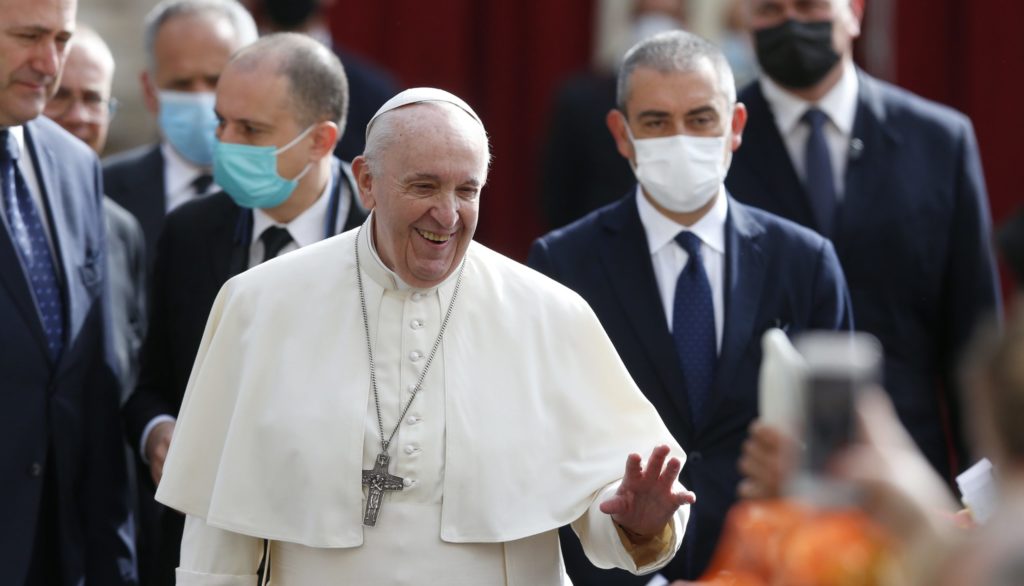Pope Francis met the faithful again in the Courtyard of St. Damasus during the General Audience on Wednesday, May 12. He was able to greet them from the central aisle at a safe distance. "Christian prayer," he said, "like the whole Christian life, is not "like taking a walk." None of the great speakers we find in the Bible and in the history of the Church has had a "comfortable" prayer. Certainly it gives great peace, but through an inner struggle, sometimes hard, which can also accompany long periods of life. Prayer is not easy. Every time we want to do it, we immediately think of many other activities, which at that moment seem more important and more urgent. Almost always, after having postponed prayer, we realize that these things were not essential at all, and that perhaps we have wasted our time. The Enemy deceives us in this way".
"All men and women of God mention not only the joy of prayer, but also the discomfort and fatigue it can cause: at times it is a hard struggle to keep the faith in the times and forms of prayer. Some saints have carried it out for years without feeling any pleasure, without perceiving its usefulness. Silence, prayer, concentration are difficult exercises, and sometimes human nature rebels. We would prefer to be anywhere else in the world, but not there, in that pew praying. Whoever wants to pray must remember that faith is not easy, and sometimes it proceeds in almost total darkness, without points of reference".
The enemies of prayer
Francis reflected on the difficulties that arise when we try to pray. "The Catechism lists a long series of enemies of prayer (cf. nn. 2726-2728). Some doubt that prayer can truly reach the Almighty: why is God silent? Faced with the inapprehensibility of the divine, others suspect that prayer is a mere psychological operation; something that is perhaps useful, but not true or necessary: one could even be a practitioner without being a believer.
"The worst enemies of prayer are within us. The Catechism calls them: 'discouragement in the face of dryness, sadness at not giving ourselves totally to the Lord because we have "many good things" (cf. Mk 10:22), disappointment at not being heard according to our own will; the wound of our pride that hardens in our unworthiness as sinners, difficulty in accepting the gratuitousness of prayer, etc.' (n. 2728)" (n. 2728). This is clearly a summary list, which could be expanded".
In the face of temptation
"What to do in the time of temptation, when everything seems to waver?" The Pope asked at St. Damasus. "If we explore the history of spirituality, we notice at once how the masters of the soul were well aware of the situation we have described. To overcome it, each of them offered some contribution: a word of wisdom, or a suggestion for facing times full of difficulty. These are not theories elaborated at the table, but advice born of experience, showing the importance of resisting and persevering in prayer.
"It would be interesting to review at least some of these counsels, because each one deserves to be studied in depth. For example, the Spiritual Exercises of St. Ignatius of Loyola are a book of great wisdom that teaches us to put our lives in order. It makes us understand that the Christian vocation is militancy, it is a decision to be under the banner of Jesus Christ and not under that of the devil, trying to do good even when it becomes difficult".
We are not alone
The Holy Father assured that we are not alone in the spiritual battle: "In times of trial it is good to remember that we are not alone, that someone is watching over us and protecting us. Even St. Anthony Abbot, the founder of Christian monasticism in Egypt, faced terrible moments in which prayer was transformed into a hard struggle. His biographer St. Athanasius, Bishop of Alexandria, narrates that one of the worst episodes happened to the hermit Saint around the age of thirty-five, a middle age that for many entails a crisis. Anthony was troubled by this trial, but he resisted. When he finally returned to serenity, he turned to his Lord with a tone almost of reproach: "Where were you? Why did you not come at once to put an end to my sufferings?" And Jesus answered, "Anthony, I was there. But I was waiting to see you fight" (Life of Anthony, 10)".
"Jesus is always with us: if in a moment of blindness we fail to see his presence, we will succeed in the future. It will happen to us too to repeat the same phrase that the patriarch Jacob said one day: "The LORD is in this place, and I did not know it" (Gen 28:16). At the end of our life, looking back, we too will be able to say: "I thought I was alone, but no, I was not: Jesus was with me".









